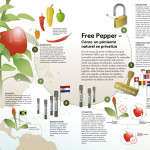Munich/ Bern/ Zurich, 3 February 2014
Today a broad coalition of 32 NGOs, farmers and breeders organisations in 26 European countries filed an opposition to a patent on sweet peppers granted to Syngenta. The company patented an insect resistance, which they copied from a wild pepper plant. Such patents are not only ethically questionable but also increase the seed market concentration, hinder innovation, and consequently pose a threat to global food security. To further highlight the issue the opponents offered a hot pepper soup to the employees of the European Patent Office whilst filing the opposition.
On 8 May 2013, the European Patent Office (EPO) granted a patent (EP 2140023) to Syngenta for insect-resistant sweet pepper plants. The sweet peppers were produced by crossing a wild pepper plant from Jamaica with commercially grown pepper plants. Since the wild plant is resistant to various pest insects, the patented insect resistance already existed in nature. Nevertheless, Syngenta now claims the ownership of insect-resistant pepper plants derived from conventional breeding, their seeds and their fruits.
“Plants produced in this way should definitely not be patentable under European patent law. The opponents are demanding that the patent be revoked. It is the first time in EPO’s history that such a widely supported opposition with opponents from 26 member countries of the European Patent Convention, has been filed, echoing the broad disagreement with the current EPO practice,” says François Meienberg for the international coalition “No Patents On Seeds!”.
In May 2012, a resolution was adopted by the European Parliament, which “calls on the EPO to exclude from patenting products derived from conventional breeding and all conventional breeding methods”. However, this resolution is widely ignored by the EPO so far. An upcoming decision due from the Enlarged Board of Appeal at the EPO may lead to a change in the way patents on conventional plants are granted. However, to bring about a much-needed and lasting change, a political decision by the administrative council of the EPO or even a change of law is needed.
The organisations behind the coalition of No Patents on Seeds! are extremely concerned that such patents will foster further market concentration, making farmers and other stakeholders of the food supply chain even more dependent on just a few big international companies and ultimately reduce consumer choice. The coalition, No Patents on Seeds! , is organised by Bionext (Netherlands), The Berne Declaration (Switzerland), GeneWatch (UK), Greenpeace, Misereor (Germany), Development Fund (Norway), No Patents on Life (Germany), Rete Semi Rurali (Italy), Reseau Semences Paysannes (France) and Swissaid (Switzerland). They are all calling for a revision of European Patent Law to exclude breeding material, plants and animals and food derived thereof from patentability. The coalition is supported by several hundred other organisations.
Report Private Claims on Nature – Syngenta’s Patent on Pepper

